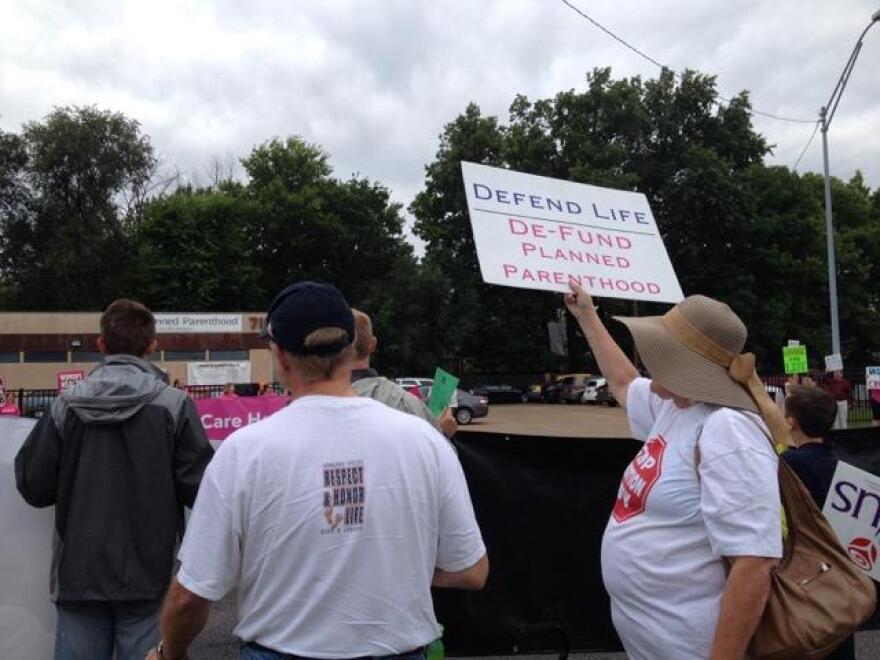The medical abortion services at the Columbia Planned Parenthood clinic have been available since August – for the first time since 2012 – but following an announcement made by the University of Missouri Health Care system on Thursday, this may not be the case for much longer.
MU Health Care announced they would be eliminating the “refer and follow” privileges that had been granted to the doctor at Columbia’s Planned Parenthood clinic and one other provider. This decision will be effective December 1, 2015.
These specific privileges had been granted to the doctor at Planned Parenthood at the end of last year after she went through an application and review process. “Refer and Follow” were necessary, because state law requires an abortion provider to have privileges through a hospital within 15 minutes driving time and/or 30 miles of the clinic.
Privileges granted by MU Health Care allowed the Planned Parenthood clinic in Columbia to get a license from the Missouri Department of Health and Senior Services to resume medical abortion services.
A special committee called the Senate Interim Committee on the Sanctity of Life was created in July to examine the Planned Parenthood facilities in Missouri – both the Columbia clinic and the St. Louis clinic. Since the committee first convened in July, members have been calling for MU to cut ties with Planned Parenthood.

Laura McQuade, the President and CEO of Planned Parenthood of Kansas and Mid-Missouri, said the univerity's decision is politically motivated.
“We were outraged that an independent university, an institution of higher learning - would cave to political pressure and in their own press release would cite that this was prompted by Kurt Schaefer's Sanctity of Life committee,” McQuade said.
She added that the provider “received notification yesterday morning via a voicemail followed by an emailed letter that MU Health care had eliminated the category of privileges in which she was privileges.”
In MU Health Care's news release they acknowledge that the examination of policy and privileges was “prompted by inquiries from various members of the legislature and public.”
"We were outraged that an independent university, an institution of higher learning - would cave to political pressure"
But MU Health Care spokesperson, Teresa Snow, said in a written statement the decision to eliminate “refer and follow” privileges was made because this specific type of privileges are no longer needed.
“’Refer and Follow’ privileges were created originally to allow healthcare providers to refer patients to our facilities and follow their patients’ care in our Electronic Medical Record (EMR). Today, any healthcare provider can refer patients to our facility and follow their progress. This type of access does not require the provider to hold any privileges at MU Health Care facilities.”
When asked if the University of Missouri Health Care system would be open to receiving and reviewing new applications for different privileges from the doctor at Columbia’s Planned Parenthood clinic, Snow responded with a “Yes.”

Senator Kurt Schaefer, who’s from Columbia, is the chair of the Senate Interim Committee on the Sanctity of life, which has been investigating Planned Parenthood in Missouri and the legality of the Columbia clinic’s license. He said he was pleased to hear the announcement, and it's a step in the right direction.
“You know, I think the university absolutely did the right thing in reviewing that and making a determination that that’s not appropriate for the university,” Schaefer said. “And for whatever reason they made the determination – I’m glad they're getting out of the abortion business.”
Senator David Sater, the co-chair of the Sanctity of Life commerce said he was “thrilled” to hear about MU Health Care’s decision. He said the committee wanted to ensure the laws were being followed properly.
"I'm glad they're getting out of the abortion business"
“We just didn't want any taxpayer money, which goes from the State of Missouri to the University of Missouri supporting Planned Parenthood,” Sater said.
Laura McQuade with Planned Parenthood said they are going to try to get privileges – either different ones through MU Health Care or through Boone County hospital - to ensure they can continue to provide all services for the community.
“We want to ensure that Planned Parenthood will be there to provide the full range of services,” McQuade said. “We will attempt to do all that we can to ensure that we will have alternative privileges for our doctor on December 1.”
She added they will be beginning the privilege application process as soon as possible, but there is no guarantee privileges will be reinstated by the beginning of December. This means Missouri women could once again live in a state with a single provider.
When asked if he and the Sanctity of Life Committee would support this – if the Planned Parenthood clinic did in fact get new privileges and adhered to all of the laws, Senator Schaefer simply said, “We will be vigilant to make sure the laws in the state of Missouri are followed.”






